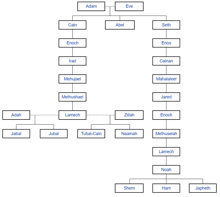The Book of the Generations of Adam is an account of the genealogy of Adam to Noah and a source reference for the Book of Genesis.[1] The book in its entirety is contained in the fifth chapter of Genesis, where it is inserted and then attributed by name. Moses or a later inspired editor would have inserted the book into Genesis to provide contrast to the genealogy of Cain.

Content[]
The Generations of Adam contains a genealogical record of the lifespans of Adam and his offspring.Before the genealogy is given, the Generations of Adam contains a very short prose narrative. The narrative describes how Adam and Eve were created in the likeness of God, as Male and Female.[2]
This narrative flows directly into the genealogy and follows a specific pattern. The record gives the age when the person became a parent, how many years they lived after becoming a parent and how many total years of their lifespan.
The people described in the genealogy are: Adam, Seth, Enosh, Cainan, Mahalalel, Jared, Enoch, Methuselah, Lamech and Noah. On three occasions additional details are provided about the people-Seth was born in the "likeness" of Adam (as Adam was created in the likeness of God),[3] Enoch was not found after living[4] and a reason is given for naming Noah "rest".[5]
Inclusion in Genesis[]
The Book of the Generations of Adam only exists in its embedded form as a source in the Book of Genesis, while at one time it would have been its own book. Moses or a later editor inserted the book into Genesis and attributed it by name.
Purpose[]
Based on the context of it's placement, the Generations of Adam was probably inserted into Genesis to compliment both preceding and following information. Immediately before the book there is a prose account of Cain's murder of Abel and the line of Cain up through Lamech.[6] Following the book there is a description of how when mankind began to grow, evil grew as well; such as the production of the Nephilim. This continues with telling how only Noah was favorable to God.[7]
It is most probable that the Generations of Adam provides both a bridge and a contrast between the line of Cain and the line of Seth, leading to Noah. The increase of evil in the world is attested to the growing population of mankind. It is explained through the account of Cain where the godlessness had originated from. A specific note is made to Seth and Enosh, that during their time people began to come back to God.[8] The detailing of the descendants of Seth and Enosh continues the ideal of following God in a time during the rapid growth of humanity.
Additionally, details like the lifespan of humanity being reduced to 120 years prior to the Flood would not make sense without the Generations of Adam. The old age of man would be little familiar to those after the reduction of lifespan and after the Flood. The age of man being over 120 is not mentioned prior to this outside of the Book of the Generations of Adam.
In the end the purpose and intent could not be known without a doubt since there is no explanation in Scripture.
As a Source[]
Moses may have been using the book as a source document and he could have inserted it into the text to give attribution; allowing a document that already described the important genealogy to give the description. The book was probably written a long time before Moses, much closer to the period of the Great Flood. In addition to divine revelation and oral tradition, the Book would have been an accurate source. This may have been one of the sources used in knowing how Seth was the son of Adam and how Adam and Eve were created in the likeness of God.
Genealogy was considered an extremely reputable source to the Hebrew audience of Genesis. Interestingly, the information in the book was not an oral tradition, but a written document. The information could have been oral at one point, but then was written down prior to Moses.
